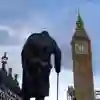



History and politics are a natural combination. Knowledge of the past helps us to understand the present. And current politics provides insights into history.
On this joint degree, you’ll explore the progress of people, events and government through time. Applying historical insights to the study of present-day politics and governance.
Be inspired by Hull’s rich history and particular contribution to national politics. And get the chance to see modern politics up close on a three-month internship at Westminster.
About this course
Our flexible course lets you tailor your studies to suit your own interests and career plans.
You’ll uncover the historical roots of contemporary social, political and environmental challenges. From classical civilisations to modern communities, you’ll explore how different periods of history continue to influence our world, and to help us understand it better.
For three months, you could intern for an MP in Westminster. Our parliamentary placement scheme has been running for over 35 years, and is one of the most extensive of its kind in the UK. It’s a once-in-a-lifetime opportunity to study the machinery of British politics, while you watch its cogs actually turning. We also support placements at a range of other organisations locally, regionally and nationally.
Hull’s a city that’s steeped in history. Explore the Hull History Centre, the Blaydes Maritime Centre, and the world renowned Wilberforce Institute. And, of course, there’s the Brynmor Jones Library. Here, we have more than a million books, journals and periodicals. As well as extensive digital resources drawn from libraries and archives across the world.
Join us for a future of making history
Module options
Filters
British Political History since 1945
The UK's political history after World War Two: from Eden to the EEC and from Wilson to the 'Winter of Discontent', encounter the people, ideas and policies that have shaped modern Britain.
compulsory
20 credits
History of Freedom
What does it mean to be free and how has the answer to this question changed over time? In ancient and medieval times, there was no expectation of individual freedom as we understand it today, rather there were degrees of ‘unfreedom’ such as slavery, serfdom, or vassalage. Later, in the age of empire, race determined who could be enslaved, and the slave trade’s legacies of racism persist into the present day: the civil rights movements and the struggle against apartheid are known as some of the most prominent recent fights for freedom. Nonetheless, the idea of freedom has far broader connotations, and you will also have the flexibility to explore diverse issues such as religious, cultural or personal freedoms.
compulsory
20 credits
Introduction to Political Ideologies
Political action is collective action among people who share beliefs. This module explores the most important formulations of these collective views. It explores political ideologies that defend the status quo, those who wish to reform it, and those that seek a radically different political reality.
compulsory
20 credits
Introduction to Policy-Making
This module provides an introduction and explanation of the plural theories and models of policy making before applying these theories and models to the practice of policy-making, via a series of case studies of policy-making in practice.
compulsory
20 credits
World War Tudors: Rethinking British History
Why are TV programmes so obsessed with certain episodes in British history such as the Tudors and the world wars? What idea of Britain is conveyed when we focus on a narrow range of stories like Boudicca’s fight against Rome, victory at Agincourt, Henry VIII’s wives or the Battle of Britain? What gets left out of British history in these simplified versions of the past? This module will invite you to critique popular culture, such as television documentaries or computer games, and to create different fresh ideas for how you think the public could engage with an aspect of the past that inspires you.
compulsory
20 credits
Human Worlds
How have humans shaped their environment, and how has the environment shaped them in return? These questions have controlled how and where we live. The availability of resources has encouraged migration and movement from the trade routes of the Silk Road across Asia to the imperial web of coaling stations that developed for the projection of naval power. How do cities grow – like St Petersburg, Delhi or Paris, built and rebuilt that has affected how generations of inhabitants later would live their lives?
compulsory
20 credits
History: Then and Now
This module explores how historians shape and debate the past. Should we study the past on its own terms as we act as neutral observers who are guided by what the sources tell us, or do historians mould the past into their own image, re-writing history for new purposes depending on each historian’s subjective preferences? In this module, we will consider these questions of objectivity, facts, bias, distortion, as well as the need for historians to return to the past and consider it from points of view that are relevant to the present.
compulsory
20 credits
Research Methods and Ethics
In this module you will begin the journey of becoming an independent and autonomous political researcher. You will learn more about how Political Research – especially that conducted within the School of Politics and International Studies – is produced, and be equipped with the understanding and skills necessary to design your own political research project. This module will prepare you for the Final Year Project and for putting into practice your own programme of research.
compulsory
20 credits
British Government
In the age of Brexit who governs Britain? Discover the workings of the British state and where power lies. From the uncodified constitution, the Office of Prime Minister and Cabinet government to Whitehall, English local government, Scottish and Welsh devolution to the great parties of state: the Conservative Party and the Labour Party and the Liberal Democrats. Encounter the traditions, institutions and political parties which govern Britain.
optional
20 credits
Our facilities

Watchlist
Dr Simon Lee
Course overview
1 min
Lucy Dunwell
Student Story
5 mins
History at Hull
Course Highlight
5 mins
Daniel Wilton - Your course in their words
Student Story
2 mins
Life on campus
University life
2 mins
Featured academics
Learn from some of the UK’s leaders in political theory and economy, international relations, and history.
We're here to inspire you – tomorrow's leaders – to realise your potential. And to leave the world in a better condition than you found it.

Dr Colin Veach
Senior Lecturer in Medieval History
Colin’s research investigates the articulation of power in medieval Britain and Ireland, placed in the context of Europe. He’s a Fellow of the Royal Historical Society, and a member of the peer review college for the Irish Research Council (IRC).

Dr Christopher Fear
Lecturer
Christopher’s recent research focused on conservative political thought; historical and contemporary. Some of his publications in this area have appeared in the Journal of Political Ideologies, History of European Ideas, and The Review of Politics.
Entry Requirements
What do I need?
This course is currently available through Clearing, which means our entry requirements are a bit different to what they would normally be.
At Hull, you're a name not a number. During Clearing, we look at all of your qualifications and experience, not just your academic grades. We may be able to offer you a place whatever your situation. Get started by completing our eligibility checker, and find out immediately if you could study at the University of Hull.
Have questions? Our admissions team will be happy to help.
Fees & Funding
How much is it?

Future prospects
The way we teach this joint degree gives you skills that employers value. You’ll learn how to analyse complex data. How to present clear and coherent arguments to diverse audiences. And by explaining, supporting and defending your ideas, you’ll become a better communicator.
You'll also gain teamworking skills through presentations and seminar discussions. And you'll learn how to plan, research and manage your own time through essays.
With a History and Politics degree, you can pursue a range of careers, such as political researcher, historian, museum conservator, researcher, or teacher. Hull graduates also work in journalism, the Civil Service, marketing, and law.
Become part of the next generation of futuremakers
Like what you've seen? Then it's time to apply.
The standard way is to apply through UCAS. This will give you the chance to showcase your skills qualities and passion for the subject, as well as providing us with your academic qualifications.
Not ready to apply yet?
Visit our next Open Day, and see all that the University of Hull has to offer. Talk to our lecturers about your subject, find out what university is really like from our current students, and take a tour of our beautiful campus and amazing facilities.
You may also be interested in...
95% employability (Politics) UK domicile full-time first degree leavers; Higher Education Graduate Outcomes statistics, for the academic year 2022/23, published by the Higher Education Statistics Agency June 2025.
History is ranked 4th in the UK for Satisfied with Feedback. The Guardian University Rankings 2026.
History: Ranked 7th in the UK for learning opportunities. National Student Survey (NSS) 2025, HEIs only.
All modules on this course page are subject to availability and this list may change at any time.